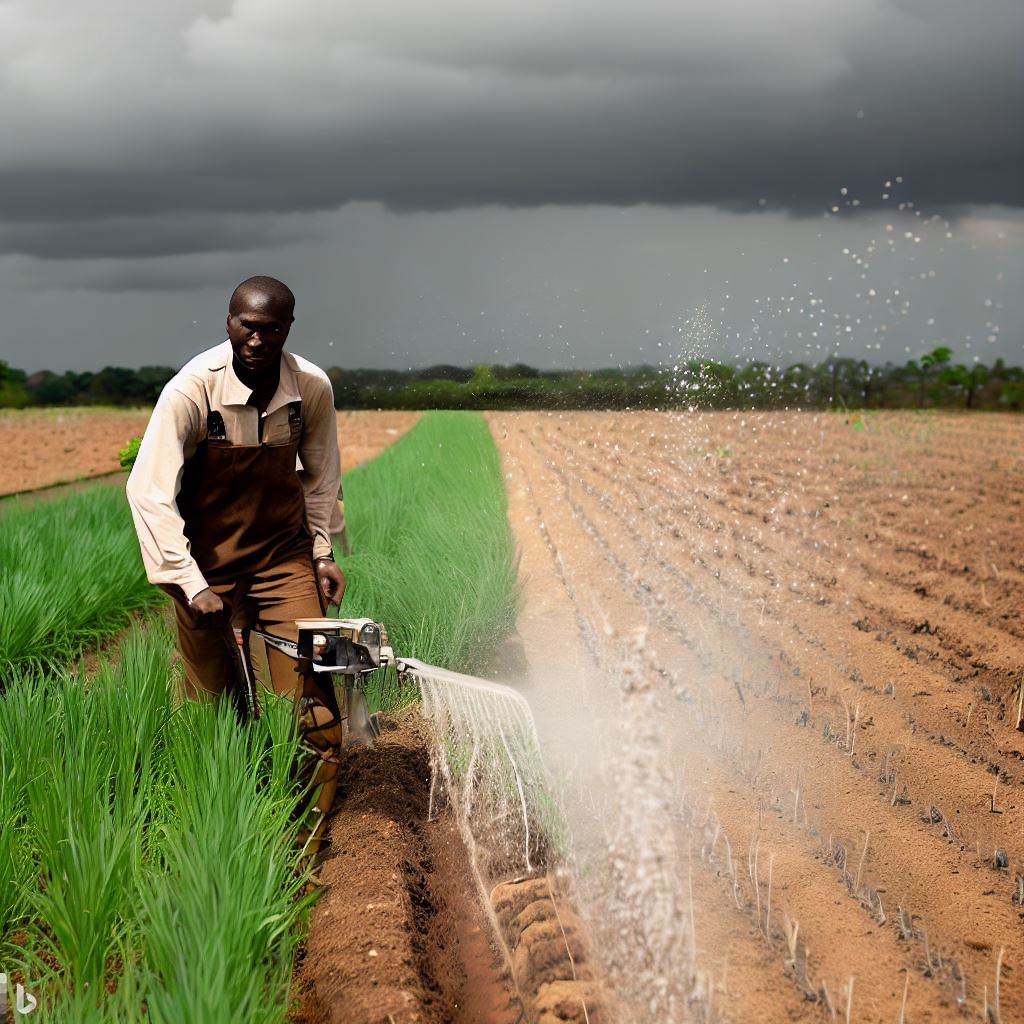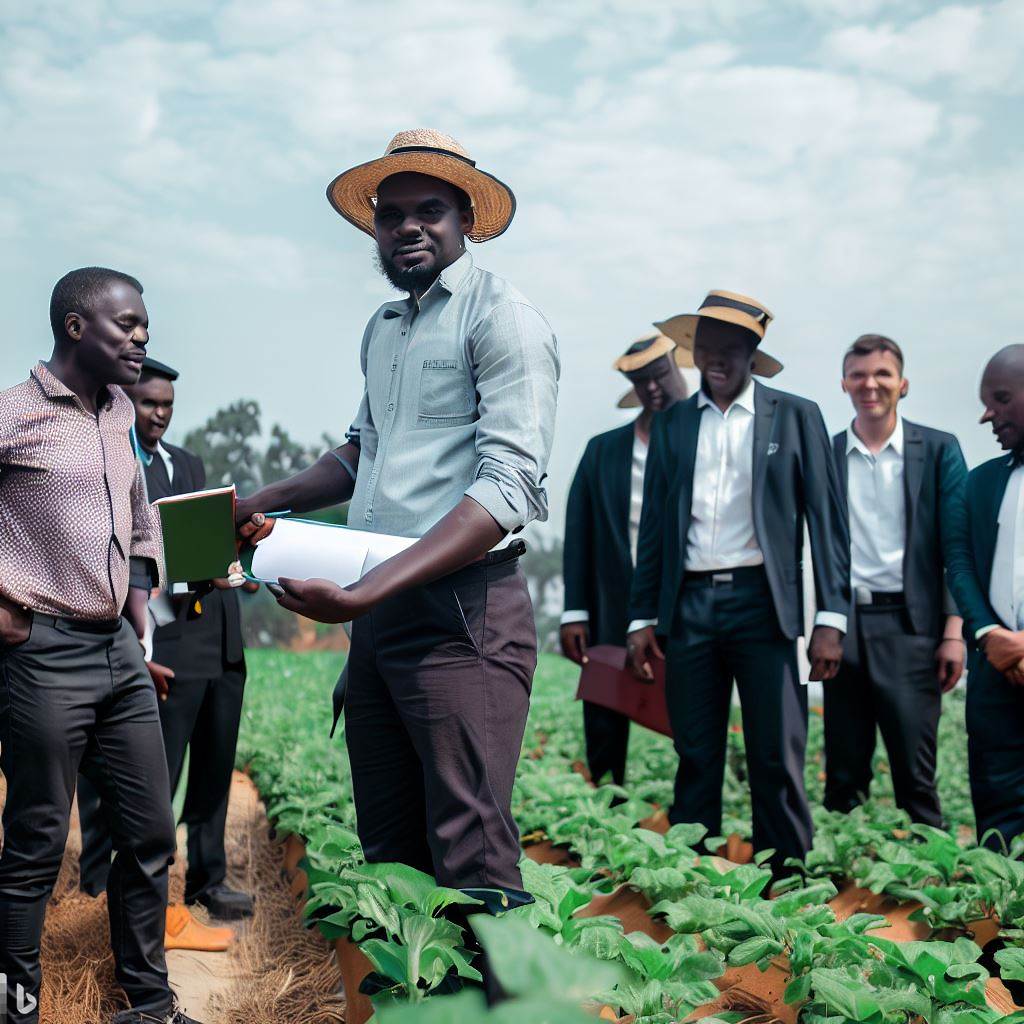Introduction
The significance of women farmers in the context of Nigeria
Women farmers in Nigeria are essential for economic growth and food security due to their crucial role in the agricultural sector.
Women farmers play a crucial role in Nigeria’s agricultural sector and their contributions are essential for economic growth and food security
Their contributions to farming activities such as crop cultivation, livestock rearing, and fisheries are vital.
They are responsible for ensuring food production and availability in Nigeria.
The majority of smallholder farmers in Nigeria are women, who often face numerous challenges in agriculture. These challenges include limited access to land, credit, and modern farming technologies.
Despite these challenges, women farmers exhibit resilience and determination.
Through their hard work, they contribute significantly to Nigeria’s agricultural output. Women farmers also play a vital role in poverty reduction and rural development.
Their farming activities create employment opportunities and stimulate economic growth.
Moreover, women farmers contribute to the overall well-being and health of their communities.
They produce nutritious food, combat malnutrition, and contribute to food security in Nigeria. The empowerment of women farmers is crucial for achieving sustainable agricultural development in Nigeria.
By promoting gender equality and providing support to women farmers, Nigeria can unleash their full potential.
Investing in the education, training, and access to resources for women farmers will lead to transformative change.
Basically, women farmers in Nigeria are of great importance to the country’s agricultural sector.
Their contributions are essential for economic growth, poverty reduction, and food security.
Read: Leveraging Cooperatives for Dairy Production in Nigeria
Historical Background of Women Farmers in Nigeria
Throughout Nigeria’s history, women farmers have played pivotal roles in shaping the nation’s agricultural landscape.
In pre-colonial times, women actively participated in various agricultural tasks, showcasing their indispensable skills and knowledge.
The colonial era witnessed changes as gender roles shifted due to external influences, yet women’s agricultural contributions persisted.
Post-independence, women continued to be the backbone of rural farming communities, driving food production and sustainability.
Long-standing tradition of women’s involvement in agriculture in Nigeria
- For centuries, women in Nigeria have played a vital role in agricultural activities.
- They have been responsible for planting, harvesting, and processing various crops.
- Traditional farming techniques and indigenous knowledge have been passed down from generation to generation.
- Women have been the backbone of rural agricultural communities, ensuring food security and sustainability.
Historical challenges faced by women farmers in terms of rights, resources, and societal barriers
- Historically, women have been marginalized and excluded from owning land and accessing credit.
- They have faced discriminatory laws and limited inheritance rights, hindering their economic empowerment.
- Access to essential resources like seeds, fertilizers, and farm machinery has been restricted for women.
- Societal norms and gender stereotypes have perpetuated the notion that farming is primarily a man’s job.
- Women have also suffered from a lack of education and training opportunities in agriculture.
Notable achievements and advancements made in recent years
- Efforts have been made to promote gender equality and women’s empowerment in agriculture.
- The Nigerian government has implemented policies and programs to support women farmers.
- These initiatives aim to address the barriers women face in accessing resources, credit, and land ownership.
- Women-led cooperatives and organizations have been established, providing a platform for collective action and advocacy.
- Training programs and capacity-building initiatives have equipped women with improved farming techniques and entrepreneurial skills.
- Women farmers have been recognized for their contributions to food security and sustainable agriculture.
- Their resilience and innovation have played a significant role in Nigeria’s agricultural development.
- Women farmers are crucial for the future of Nigeria’s agriculture sector.
It is essential to continue supporting and empowering women in agriculture to achieve food security, reduce poverty, and promote sustainable development.
Recognizing women farmers’ contributions, Nigeria must address gender inequalities, ensure resource access, and unlock agricultural prosperity.
Read: Nigeria’s Pioneering Dairy Producers: Success Stories

Economic Contributions of Women Farmers
Women farmers play a pivotal economic role, powering agriculture and driving rural communities’ prosperity.
Their active involvement in farming contributes substantially to food production, ensuring food security and stability.
Beyond subsistence, women’s agricultural endeavors generate income, boosting family finances and local economies.
Their diverse roles span crop cultivation, livestock rearing, and agribusiness, fueling value chains and market dynamics.
Scale and Scope of Women’s Involvement in Agriculture in Nigeria
- Women make up a significant proportion of Nigeria’s farming population.
- They are actively engaged in all sectors of agriculture, including crop cultivation and livestock rearing.
- The number of women involved in agriculture has been steadily increasing over the years.
- Many women farmers operate at subsistence level, providing food for their families and communities.
- Others engage in commercial farming, contributing to the national economy.
Importance of Women Farmers in Ensuring Food Security
- Women play a vital role in ensuring food security in Nigeria.
- They are responsible for producing a significant portion of the nation’s food.
- Women farmers contribute to the availability and accessibility of food in both rural and urban areas.
- Through their efforts, they help to prevent food shortages and maintain stable food prices.
- Empowering women farmers is crucial for achieving food security and reducing hunger in Nigeria.
Role of Women Farmers in Nigeria’s Rural Economy
- Women farmers are essential contributors to Nigeria’s rural economy.
- They generate employment opportunities within their communities.
- The revenue generated from women-led agricultural activities circulates in the local economy.
- Women farmers contribute to poverty reduction by increasing household income and improving living standards.
- They also play a significant role in promoting sustainable rural development in the country.
Examples of Successful Women-Led Agricultural Enterprises
- Abisola Olusola is a successful woman farmer who owns a large-scale poultry farm in Lagos.
- Under her leadership, the farm has flourished, creating employment opportunities for the local community.
- She has implemented modern farming techniques, increasing productivity and profitability.
- Another example is Zainab Ahmed, who runs a thriving vegetable farm in Kano State.
- Her farm supplies fresh produce to markets in the region, contributing to food security.
Generally, women farmers in Nigeria make significant economic contributions.
They are actively involved in various agricultural sectors, ensuring food security, and driving rural economies.
Their efforts not only provide sustenance for their families but also contribute to national development.
It is essential to recognize and support the role of women farmers in Nigeria’s agriculture sector for overall economic growth and development.
Read: Profitability Analysis of Dairy Production in Nigeria
Social and Environmental Implications
The intersection of agriculture and society triggers diverse social dynamics and profound environmental consequences.
Agricultural practices directly influence water use, soil health, and biodiversity, shaping ecosystems and landscapes.
Intensive farming methods can degrade soil quality, leading to erosion, reduced fertility, and long-term environmental degradation.
Chemical inputs impact water bodies, potentially leading to contamination, affecting aquatic life and human health.
Deforestation for agriculture disrupts ecosystems, leading to habitat loss, species decline, and imbalanced ecological harmony.
Impact on Poverty Reduction and Local Communities
- Women farmers play a crucial role in reducing poverty and improving livelihoods in Nigeria.
- By actively participating in farming activities, women contribute to food security and economic stability.
- They generate income for their families, provide nutritious food, and improve the overall community’s well-being.
- Women farmers often form cooperatives, which helps them access markets, receive training, and acquire necessary resources.
- These collaborations empower women economically and strengthen social solidarity among local communities.
- The involvement of women in farming also leads to a more equitable distribution of wealth and resources.
- Through their engagement in agriculture, women challenge traditional gender roles and promote gender equality.
- Empowered women farmers become agents of change within their communities and inspire the next generation.
- Overall, women farmers contribute significantly to poverty reduction and enhance the development of local communities.
Role in Promoting Sustainable Farming Practices
- Women farmers are champions of sustainable farming practices that protect the environment and ensure long-term farm productivity.
- They adopt organic farming techniques, minimize pesticide use, and prioritize agro-ecological approaches.
- Women preserve seeds, practice crop rotation, and protect soil health, leading to increased resilience against climate change.
- Their knowledge of indigenous farming methods and traditional crops contributes to agricultural biodiversity.
- Women farmers are often front-runners in promoting agro-forestry and sustainable water management techniques.
- By embracing sustainable practices, they reduce soil erosion, conserve water resources, and promote ecosystem health.
- Women’s involvement in sustainable farming protects the quality and nutrition of food produced.
- Their efforts towards sustainability mitigate environmental degradation and promote ecological balance.
- Women farmers create models of farming that are both environmentally conscious and economically viable.
Contribution to Biodiversity Conservation and Climate Change Mitigation
- Women farmers make significant contributions to biodiversity conservation through their preservation of traditional crops.
- They cultivate diverse varieties of crops, ensuring the continuation and preservation of genetic diversity.
- Preserving traditional crops helps safeguard against the loss of essential nutrients and food security.
- Women farmers actively participate in seed banks and exchange genetic materials, further promoting biodiversity.
- In the face of climate change, women farmers adapt and employ resilient farming techniques.
- They promote the use of climate-smart agricultural practices, such as drought-resistant crop varieties.
- Women play a crucial role in raising awareness about climate change’s impact on agriculture.
- They actively engage in climate change mitigation by promoting carbon sequestration through agro-forestry.
- Women’s knowledge of local ecosystems and climate patterns enables effective adaptation strategies.
Women farmers in Nigeria have a significant impact on poverty reduction, local communities, sustainable farming practices, biodiversity conservation, and climate change mitigation.
Their active participation in agriculture brings economic stability, empowers women, and challenges gender roles.
Women farmers promote sustainable farming techniques, protect the environment, and enhance food security.
Their dedication to preserving traditional crops and adopting climate-smart practices contributes to biodiversity conservation and climate change mitigation.
Recognizing and supporting the important role of women farmers is crucial for achieving sustainable development and agricultural resilience in Nigeria.
Read: Profitability Analysis of Dairy Production in Nigeria
Challenges and Barriers Faced by Women Farmers
Limited Access to Land, Credit, and Training
- Women farmers in Nigeria face challenges of limited access to land, often unable to own or control land for farming purposes.
- Lack of access to credit is another barrier, as women farmers struggle to secure loans for purchasing inputs and equipment.
- Inadequate training opportunities hinder the success of women farmers, as they lack knowledge and skills to improve their farming practices.
Gender Disparities in Resource Allocation and Access to Markets
- Women farmers experience gender disparities in resource allocation, with limited access to productive resources such as fertilizers, seeds, and machinery.
- Unequal access to markets is a significant barrier for women farmers in Nigeria, as they face discrimination and lower prices for their produce compared to men.
- Cultural norms and gender roles restrict women farmers’ participation in decision-making processes related to marketing and sales.
Governmental and Non-Governmental Initiatives to Address Challenges
Government and non-governmental efforts collaboratively address agricultural challenges, forging pathways to sustainable solutions.
Governments develop policies supporting farmers, ranging from subsidies to market access, aiming for equitable growth.
Non-governmental organizations empower farmers with training, resources, and advocacy, amplifying their voices and impact.
Innovative projects by NGOs introduce modern techniques, bolstering productivity, and enhancing resilience against climatic variations.
Collaboration between these entities creates a synergy that strengthens agricultural landscapes, fostering progress and prosperity.
The Nigerian government has recognized the importance of women farmers and has implemented various initiatives to address their challenges
- One such initiative is the National Gender Policy, which aims to promote gender equity and empower women in agriculture.
- The government has also established the Agricultural Credit Guarantee Scheme Fund, providing women farmers with access to affordable credit.
- Additionally, the Ministry of Agriculture runs programs to improve the technical skills and knowledge of women farmers through training and capacity-building workshops.
Non-governmental organizations (NGOs) play a crucial role in supporting women farmers in Nigeria
- NGOs like the Women Farmers Advancement Network (WOFAN) provide training and mentorship programs, assisting women farmers in enhancing their productivity and income.
- These organizations also facilitate access to markets by linking women farmers with potential buyers and providing marketing support
- Collaborative efforts between NGOs, government agencies, and international partners assist in addressing the challenges faced by women farmers collectively.
In Nigeria, women farmers face hurdles restricted by inadequate land, credit, and training, hindering productivity and profitability.
Women farmers in Nigeria face hindrances inadequate land, credit, and training curb productivity and profitability.
Opportunities for Empowering Women Farmers
Empowering and supporting women farmers vitalizes their well-being and propels Nigeria towards food security and sustainable agricultural growth.
Potential Benefits of Empowering Women Farmers in Nigeria
- Economic empowerment: Women can contribute significantly to the growth of Nigeria’s agricultural sector.
- Poverty reduction: Empowering women farmers can help alleviate poverty and improve livelihoods.
- Food security: By empowering women, food production can increase, leading to improved food security.
- Women’s empowerment: Empowering women in agriculture promotes gender equality and enhances women’s social status.
Strategies for Promoting Gender Equality and Empowering Women in the Agricultural Sector
- Providing access to land: Women should have equal rights to land ownership and use, enabling them to participate fully in farming activities.
- Access to financial resources: Women farmers should have access to credit, loans, and financial services to invest in their farms and businesses.
- Technology and innovation: Ensuring women have access to agricultural technologies can enhance productivity and efficiency.
- Extension services: Strengthening extension services tailored to women’s needs can provide them with technical assistance and knowledge.
- Market access: Creating opportunities for women farmers to access local, regional, and international markets can increase their income and economic empowerment.
- Policy support: Governments should implement supportive policies that address gender disparities in agriculture and promote women’s inclusion.
Importance of Education, Training, and Capacity Building for Women Farmers
- Skills development: Education and training equip women farmers with the necessary skills to improve productivity and adapt to changing agricultural practices.
- Improved decision-making: When women farmers have access to education and information, they can make informed decisions about their farming practices, leading to better outcomes.
- Technological adoption: Education and capacity building enable women to effectively utilize modern agricultural techniques and technologies.
- Increased resilience: Through education and training, women farmers can develop resilience to climate change and other challenges in the agricultural sector.
- Entrepreneurial opportunities: Education empowers women with the knowledge and confidence to explore entrepreneurial ventures, creating additional income streams.
Empowering women farmers in Nigeria has immense potential benefits ranging from economic and social empowerment to poverty reduction and food security.
Strategies for promoting gender equality in agriculture include providing access to land, financial resources, technology, extension services, market access, and policy support.
Furthermore, education, training, and capacity building are crucial for enhancing the skills, decision-making capabilities, technological adoption, resilience, and entrepreneurial opportunities for women farmers.
Embracing gender equality in the agricultural sector is not only a matter of justice but also a pathway towards sustainable development and inclusive growth.
Conclusion
This blog post highlighted the importance of women farmers in Nigeria.
Women farmers play a significant role in food production, poverty reduction, and economic development in Nigeria.
To support women farmers and promote gender equality in the agricultural sector, it is essential to take action.
Therefore, I encourage individuals, organizations, and the government to:
- Provide access to land, credit, and resources for women farmers.
- Invest in agricultural training and education programs for women.
- Create policies and programs that empower women and promote gender equality.
By empowering women farmers, Nigeria can achieve sustainable agricultural development and improve the livelihoods of its people.
Let us work together for a more inclusive and prosperous future.




